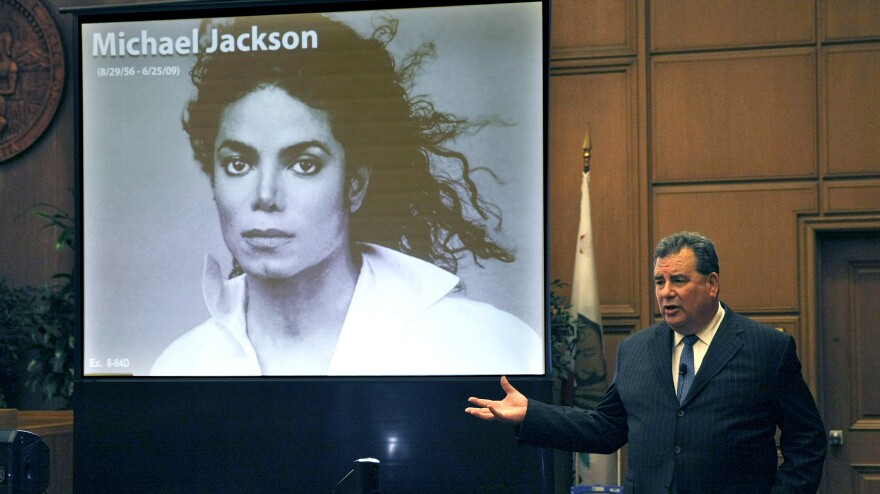A Los Angeles jury has found concert promoter AEG Live was not negligent in the death of pop superstar Michael Jackson, who died of a sedative overdose four years ago.
Jackson's mother had sought $1.5 billion in damages — a figure AEG's attorney called "ridiculous" last week.
Reuters reports the jury ruled unanimously. The 12-person panel in the wrongful death lawsuit was made up of six men and six women, but only nine jurors were needed to decide the case.
The verdict ends a trial that lasted five months, with Jackson's mother and siblings accusing the concert promoter of negligence in hiring and supervising Dr. Conrad Murray. Murray was found guilty of involuntary manslaughter by a jury in 2011 for giving the pop star the sedative propofol, the drug blamed for his death.
Jurors deliberated for parts of two days last week before deciding to take a long weekend. On the eve of the verdict, here's how The Los Angeles Times summed up the dilemma the jury faced:
"What the case may come down to is whether jurors think that Jackson is to blame for his own demise by insisting on hiring the doctor who killed him, or that AEG Live executives were such poor witnesses that nothing they said can be believed."
Jackson died in June of 2009, less than a month before his blockbuster This Is It tour was scheduled to begin. AEG Live was the promoter of the tour's 50 concerts, which were billed as Jackson's first major tour since 1997. Two AEG executives were dismissed from the lawsuit last month after Judge Yvette M. Palazuelos ruled that the plaintiffs had not proven they were liable.
Jackson's mother, Katherine, argued that AEG Live erred in hiring Murray and failed to intervene on her son's behalf. The concert promoter maintained that it did not want to hire Murray, and that he was involved only at the singer's insistence. The company also said it didn't hire Murray, but had planned to advance the money for his $150,000 monthly salary to Jackson.
Some of the most potentially damaging material presented at the trial was a batch of emails between AEG executives that seemed to undermine their claims that they had little to do with Murray.
In his closing arguments last Tuesday, Jackson attorney Brian Panish reminded the jury of an email presented during the trial that was sent by AEG co-CEO Paul Gongaware. Panish said the message proves the company, which faced the possibility of steep financial losses, pressured Murray to ensure Jackson could perform on stage.
Here's how that email read, in response to concerns that the doctor had held Jackson out of a rehearsal less than two weeks before his death:
"We want to remind (Murray) that it is AEG, not MJ, who is paying his salary. We want to remind him what is expected of him."
In a taped deposition, Gongaware said he couldn't recall writing the email.
In closing arguments for AEG, attorney Marvin Putnam said that Jackson was "responsible for his own choices — no matter how bad those choices might ultimately prove to be."
"It was Mr. Jackson, not AEG Live, that chose Dr. Conrad Murray," Putnam told the jury.
He also played a video for the jurors, showing rehearsals for the This Is It tour that were filmed on June 23, two days before Jackson's death. Saying that the video showed Jackson in good form, Putnam recommended that the jury request to see the full film — something they did on Friday, before adjourning for the weekend.
The jury also asked to see AEG Live's contract for Murray's work, the AP reports.
Copyright 2020 NPR. To see more, visit https://www.npr.org.



